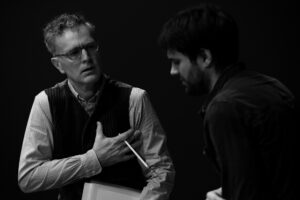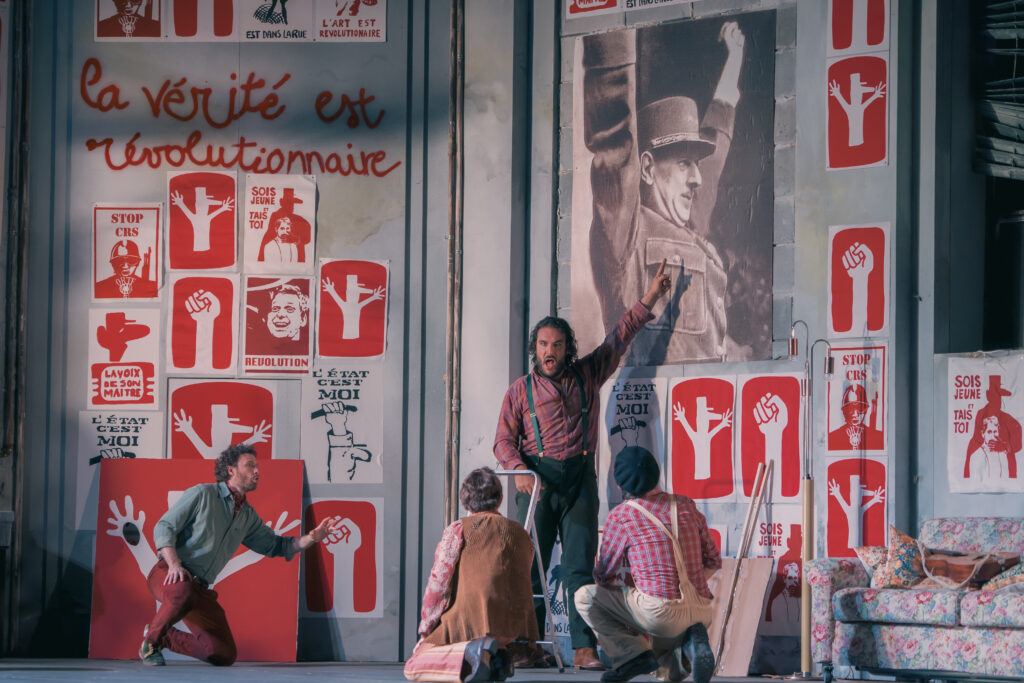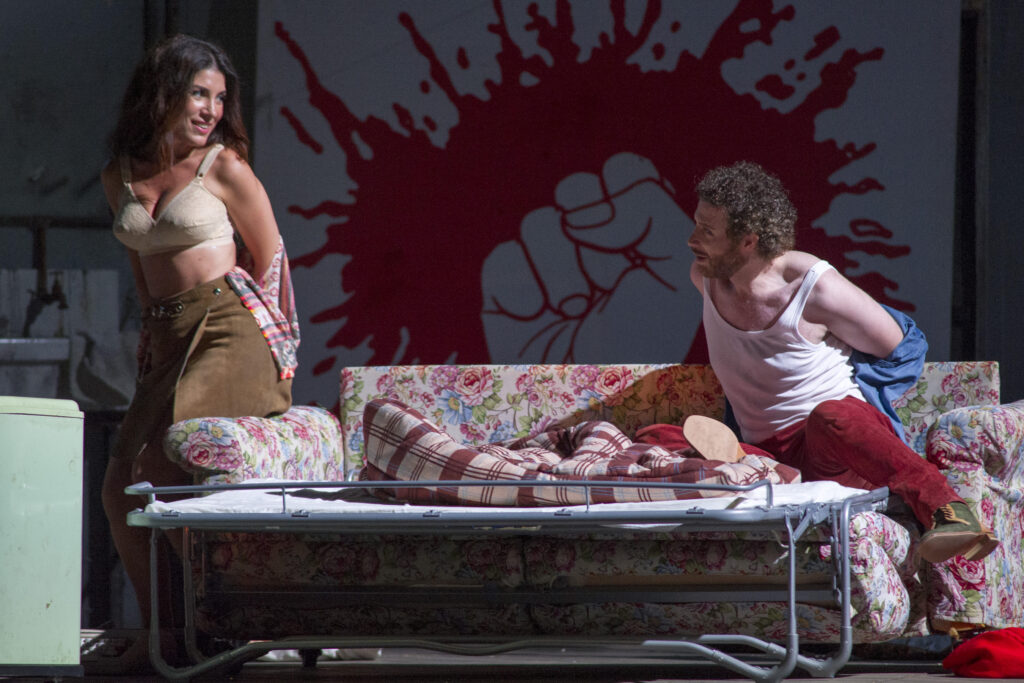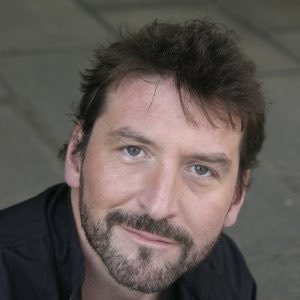
Q & A: Christophe Gayral on the Puccini Festival, ‘La Bohème’ & Updating the Opera
By Francisco Salazar(Mise en scène Christophe Gayral, Décors Christophe Ouvrard, Costume Tiziano Musetti)
On July 14, the Puccini Festival opened with a new production of “La Bohème” directed by Christophe Gayral. The production updated the opera to 1968 during the student protests in France. It was a concept that was presented at the festival in November of 2022 and one that was met with excitement.
But, on opening night Music Director Alberto Veronesi made headlines when he decided to blindfold his eyes in order not to see the production. The result was an international scandal that had the festival condemn Veronesi’s actions and also had some of the press making up stories regarding the production.
Following the incident, Gayral spoke to OperaWire regarding his production and how he viewed the updated version.
OperaWire: Tell me about your production.
Christophe Gayral: For me, it was really a question of doing something new for the audience of Torre del Lago. “La Bohème” is often full of stereotypes, Paris, snow, winter…and poor bohemians. That is why I thought about transposing it. First of all, “La Bohème” is Paris and Christmas and in fact we didn’t want to change that. I was an actor for 20 years and for me words, the libretto, and the dramaturgy are the base of theater and opera production. I have directed “Radamisto ” and “ Farnace ,” and those librettos are really pretty thin, so there you have to invent a lot. But when you are staging “Bohème,” which is such a masterpiece if you have read Henri Murger’s “Scènes de la Vie de Bohème,” which is also an extraordinary book, that is enough and you have there everything you need to create the necessary dramaturgy.
Fortunately, all the craziness of these young artists, enjoying life, not caring about the future is in the text because the libretto is also very well crafted. For me, the text is as important as the music and some of the press is saying that I apparently changed the story and the words. They said I took liberty with the libretto. But I did not. I took the liberty of a director whose job it is to give a new reading to a work and not to repeat the same things. That is why on a new production, I always work straight from the libretto and the music because I am really connected to them. Music has been part of my life for years and for me, opera is “singing theater.”
As a director, I think it is also important to make things work coherently. So, I thought of doing a modern “Bohème” yes, but I questioned whether or not we still have bohemians in today’s society. My answer was no. Of course, we have activists, but in 2023 real bohemians do not exist anymore. So I thought to search for our bohemians in our more recent history. And I thought, perhaps because I’m French and I live near the Quartier Latin, “What about what was happening
during May ‘68 in the Ecole des Beaux-Arts, which was a nest for young bohemian artists at that time?”
In fact, the attacks by Veronesi and others who take this occasion to speak about “ultra-communism” are misplaced: May 1968 was a global protest movement made certainly by left-wing workers, artists, and students, but it also involved the bourgeois right. I worked with my set designer, Christophe Ouvrard, on what
those students from the Ecole des Beaux-Arts created in 1968, and so that’s why the set of our show is covered with posters of the period, where you could find for example the Beaux-Art students’ caricatures of Charles de Gaulle as well as their street slogans. I think 1968 was a very important period, and not just in Paris. It was really a global revolution where suddenly people started to want to look for a new way of life.
It was also after Vietnam. It was also the beginning of Flower Power and the hippie movement. Since we were trying to make a new Boheme production that would be nearer to us in time and feeling, we thought to have a more modern, more sexual Mimi: a young woman who knows what she wants.

Giorgio Andreuccetti
OW: When you were working on this production with the Puccini festival, did you work with Veronesi during rehearsals?
CG: Yes, absolutely. I would like to be clear on this point because it’s very important. First of all, the set models and costume designs were presented and explained to everyone in February. And Veronesi agreed to the project.
Veronesi always knew it was not a historical production. And in February, it was more clear because at this time all the sets and costumes were on paper. The festival from the beginning was also with me and supported me in the direction of the production.
I was very shocked that on opening night Veronesi came out wearing a blindfold. But the scandal had already started a few days before, because Vittorio Sgarbi, an under-secretary from the Ministry of Culture, tried to encourage Veronesi not only to not conduct the show at all but also went so far as to even ask for the show to be destroyed before anyone could see it.
So at this moment, I understood that Veronesi had in fact been against my ideas and it came as a surprise because, in fact, during the rehearsals, he never said a word against the production.
This, for me, is simply a politically motivated scandal and not an artistic one.
OW: What else did you hear from Meloni’s government?
CG: One writer said that my show was an invention of the festival to mock Meloni’s government. But, in fact, it was never my intention to present anything against the present government, and if you look at the production it is completely clear that there are no references to that. If there is a bridge to the present day, it can be found at the end of the show, because of my desire to refer to the ideas of ’68, but then also to see what impact those ideas have had on us today and in
what way they are still present.
I wished with our ending to question where we are now in 2023 with the problems of ’68 (world peace, social justice, human rights, etc.), and I think we haven’t advanced much since then. In addition, we now have the climate crisis and a new war threatening to engulf the world – and I don’t think we can count on AI to save us.
OW: What was the relationship with the singers of this production? Were they receptive to the ideas?
CG: The relationship with the singers was excellent. The transposition was not a problem for them at all. I mean, the singers were completely open, free, and happy from the beginning. They’re young and modern and I imagine that they have performed in various “Bohème” productions around the world. So for them, a new “Bohème” is stimulating and in no way blasphemy.

Giorgio Andreuccetti
OW: The Puccini Festival condemned Veronesi’s actions. How do you feel about them having released this statement and also siding with you?
CG: When you are a conductor, you conduct with your hands, but also with your eyes. And so I think they made the right decision to change the conductor since he said he would continue to conduct blindfolded: it’s not only for me but it’s also for the soloists, for the orchestra, for the chorus… and above all for the audience.
OW: What’s next for you after this “Bohème? What other operas are you interested in directing in the future?
CG: I’m going back to Baroque opera because it’s also very interesting and challenging. But I also hope this “Bohème” will continue its journey, also in an indoor theatre. Even though the Festival theatre is a large space with 3,400 seats, we worked to keep as many staging details as readable as possible. It would be interesting to develop those ideas further in a closed theater as well.


